If you really care for
Your heart-enlightenment,
Then you must never be late for
Your God-appointments.
Sri Chinmoy, Twenty-Seven Thousand Aspiration-Plants, part 179, Agni Press, 1993
Sri Chinmoy saw music as the universal language of the heart, dissolving barriers of race, language and culture. "It is through music," he said, "that the universal feeling of oneness can be achieved in the twinkling of an eye." 1
To Sri Chinmoy, soulful music is next to meditation in its capacity to bring our heart to the fore and draw us beyond the limitations of the mind.
“When we listen to soulful music, or when we ourselves play soulful music, immediately our inner existence climbs up high, higher, highest. It climbs up and enters into something beyond.”
Sri Chinmoy 2
Sri Chinmoy composed his first songs while he was still a teenager in India. Over the next 60 years, he composed more than 23,000 songs - over 13,000 in Bengali, over 7,000 in English as well as songs in Sanskrit, French and other languages.
Video interview: "Through music I try to offer my feeling of oneness, inseparable oneness."
Many of these songs, particularly those in Bengali, are devotional in nature, and singing them awakens the heart and brings one in closer touch with the Divine.
Sri Chinmoy sings his Bengali song "Swapan Tari". He starts by reading out the English translation: "O my dream boat, O my dream-boat, Where do you abide?…."
The songs range in length from short cheerful mantras to be sung repeatedly, to long and lofty epic songs - the longest being the 56-stanza Dhyulok Chariye Nara Narayan (Today God on Earth descends).
Sri Chinmoy also composed many songs appreciating the best qualities of countries, landmarks and people. Sometimes he would set to music quotes by people that he admired.
Search 20,000+ songs at Sri Chinmoy Songs.
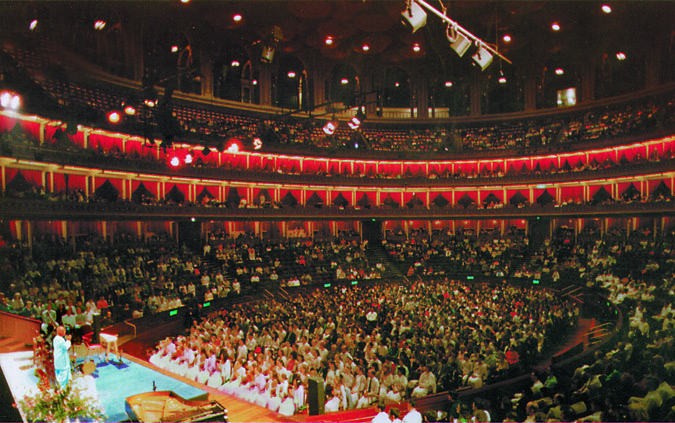
Between 1984 and 2007, Sri Chinmoy offered around 800 Peace Concerts at venues around the world, such as the Royal Albert Hall in London, New York's Carnegie Hall, Tokyo's Nippon Budokan, and the Sydney Opera House. During these concerts of prayerful and meditative music, Sri Chinmoy sought to offer an experience of inner peace to the audience.
"I try to play all my instruments prayerfully, and the audience is also invited to pray and meditate. It is not an experience of excitement; I am not coming to excite anybody. It is an experience of enlightenment or, you can say, oneness. We have to pray, we have to meditate, we have to do everything together, together. Here we are not coming to sing the song of supremacy, but we are coming to sing the song of the heart's intimacy."
Sri Chinmoy 3
A short video of Sri Chinmoy's 1991 concert in Chicago, showing the opening meditation, esraj and flute performances.
Typically, he would begin a concert with a short meditation before playing on a range of eastern and western instruments - flute, esraj, harmonium, taktiri, to name a few. Often his concerts would culminate in a powerful and spontaneous performance on piano or synthesizer.
Thirty-five of Sri Chinmoy's Peace Concerts had an audience of over 5,000 people, with a largest audience of 19,000 in Montreal, Canada on 23 September 2000.
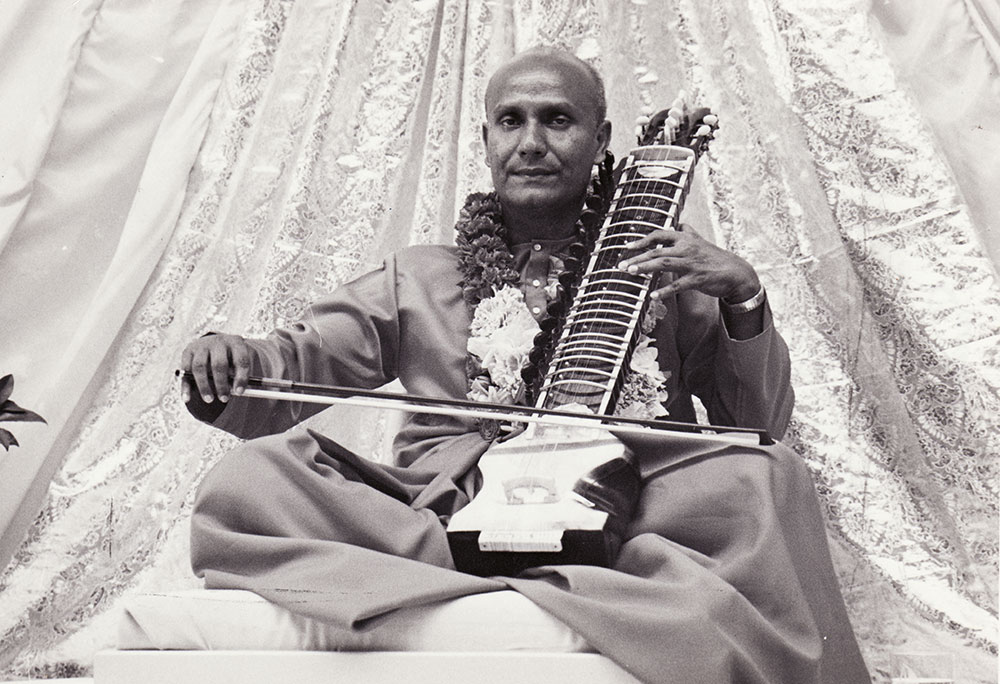
Sri Chinmoy regarded the esraj, an Indian stringed instrument that is played with a bow, as his favourite instrument.
An esraj performance from the the album "Esraj: My Inspiration-Aspiration-Source"
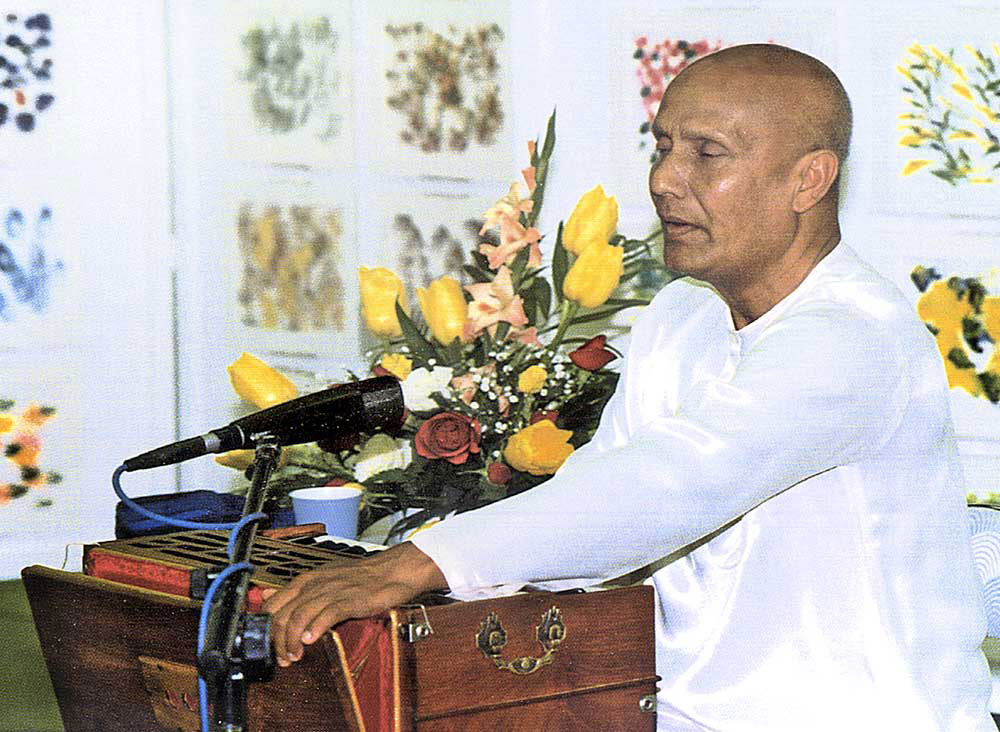
Sri Chinmoy sings, from the album "My Prayerful Salutations to the United Nations"
Flute performance by Sri Chinmoy during the Paris Peace Concert 1984.
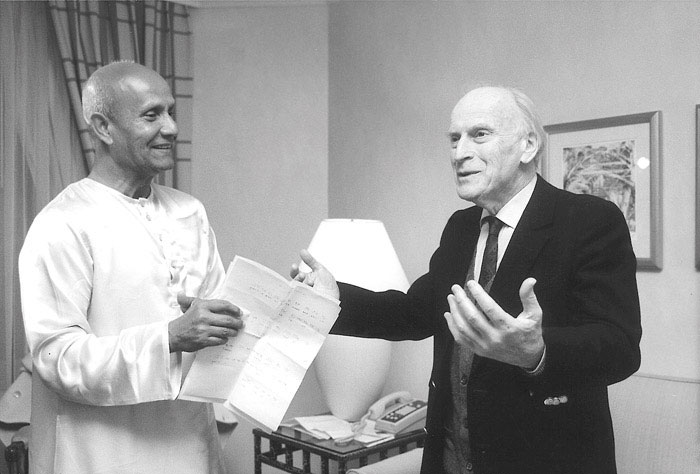
"Your life has been a continuous flow of living inspiration and dedication to the triumph of the humane." 5
Yehudi Menuhin, 13 August 1996.
See also: Kind words from musicians.
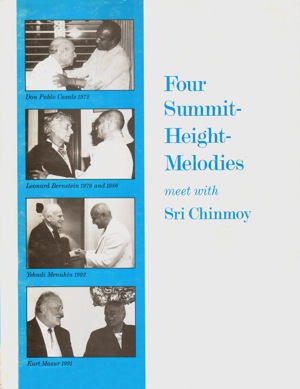
This book details Sri Chinmoy's meetings and conversations with four great musicians - Don Pablo Casals, Leonard Bernstein, Yehudi Menuhin and Kurt Masur.
Leonard Bernstein described Sri Chinmoy's work as "a miraculous model of the abundance in the creative life that we lesser mortals seek."
Read the full book: Sri Chinmoy Library
Related pages
Sri Chinmoy's recordings at Radio Sri Chinmoy
More information on Sri Chinmoy's Peace Concerts
A talk entitled: God the Supreme Musician
Sri Chinmoy, Sri Chinmoy speaks, part 4, Agni Press, 1976.↩︎
Sri Chinmoy, God the Supreme Musician, Agni Press, 1976.↩︎
Sri Chinmoy, "Dreamer of World Peace", p.17, Agni Press, 1998.↩︎
Photograph by Sarama Minoli.↩︎
Sri Chinmoy, https://www.srichinmoylibrary.com/ym-14e9[Yehudi Menuhin: The soul-smile and the heart-cry]], Agni Press, 1996↩︎